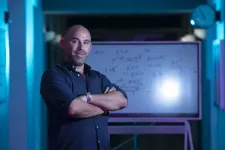(Press-News.org) When someone has a stroke, it can accelerate the loss of cognitive ability over the coming years.
Stroke survivors who have attended some level of higher education may face even steeper mental declines, according to a study led by Michigan Medicine.
In an analysis of cognitive outcomes for more than 2,000 patients seen for stroke between 1971 and 2019, college graduates performed better on initial post-stroke examinations of global cognition, a measure of overall cognitive ability that includes mental functions like memory, attention and processing speed.
However, stroke survivors who attended any level of higher education had faster declines in executive functioning — skills used to manage everyday tasks, such as working memory and problem solving — compared to patients with less than a high school degree.
“Brain atrophy occurs over time regardless of education level,” said Mellanie V. Springer, M.D., M.S., first author and Thomas H and Susan C Brown Early Career Professor of Neurology at University of Michigan Medical School.
“Our findings suggest that attending higher education may enable people to retain greater cognitive ability until a critical threshold of brain injury is reached after a stroke. At this point, compensation may fail, and rapid cognitive decline occurs.”
For years, researchers have considered education level as a predictor of cognitive reserve, the ability to preserve higher levels of functioning despite brain injury that occurs over the course of life.
This led Springer and her colleagues to hypothesize that highly educated people would have slower cognitive decline after a stroke.
The results, published in JAMA Network Open, reflect the opposite.
“Dementia is a greater threat after a first stroke than having another stroke,” said senior author Deborah A. Levine, M.D., M.P.H., professor of internal medicine and neurology at U-M Medical School.
“We lack treatments that prevent or slow cognitive decline and dementia after stroke. This study increases our understanding and generates potential hypotheses about the causes of post-stroke cognitive decline and which patients face higher risks of it.”
Having a higher number of the ApoE4 allele, a genetic risk factor for Alzheimer's disease, did not affect the association between education level and cognitive decline after stroke. The number of strokes a person suffered also did not affect the relationship.
This means, notes Springer, that the critical point of brain injury at which cognitive compensation fails in the highly educated does not depend on underlying genetic risk and can be reached after a single stroke.
“Identifying which stroke patients are at the highest risk for cognitive decline will help target future interventions to slow cognitive decline,” Springer said.
Additional authors: Rachel T Whitney, Ph.D., Wen Ye, Ph.D., Emily M. Briceño, Ph.D., Rebecca A. Ferber, Bruno Giordani, Ph.D., Rodney A. Hayward, M.D., Adam S. Kollipara, M.P.H., and Jeremy B. Sussman, M.D., M.S., all of University of Michigan, see remaining authors online.
Funding/disclosures: This research was supported by National Institute on Aging (RF1AG068410) and the National Institute of Neurological Disorders and Stroke (K01NS11755), of the National Institutes of Health.
The National Institute on Aging was not involved in the design and conduct of the study; collection, management, analysis, or interpretation of the data; preparation, review, or approval of the manuscript; or the decision to submit the manuscript for publication. A representative of the National Institute of Neurological Disorders and Stroke is a co-author on the manuscript and reviewed the manuscript for intellectual content but was not directly involved in the design and conduct of the study; collection, management, analysis, or interpretation of the data; preparation or approval of the manuscript; or the decision to submit the manuscript for publication.
Paper cited: “Association between education and post-stroke cognitive trajectories,” JAMA Network Open. DOI: 10.1001/jamanetworkopen.2025.2002
END
Highly educated people face steeper mental declines after stroke
Identifying which stroke patients are at the highest risk for cognitive decline will help target future interventions, researchers say
2025-03-26
ELSE PRESS RELEASES FROM THIS DATE:
New study shines a light on the mechanics of bioluminescence in the rare fish Vinciguerria mabahiss
2025-03-26
Los Angeles (February –, 2025)—Evolving roughly 27 different times in the long history of fish, bioluminescence—the biological production of light—is one of the flashier survival tools used for luring prey, communication, and recognizing potential mates among various species. In a new study published in Ichthyological Research, an international team of researchers studied the organs that produce light in Vinciguerria mabahiss, a rare species of fish from the Red Sea. This paper marks the first-ever close examination of these organs, providing key information on their structure ...
Getting hit by lightning is good for some tropical trees
2025-03-26
Getting zapped with millions of volts of electricity may not sound like a healthy activity, but for some trees, it is. A new study, published in New Phytologist, reports that some tropical tree species are not only able to tolerate lightning strikes, but benefit from them. The trees may have even evolved to act as lightning rods.
The research was led by Evan Gora, a forest ecologist at Cary Institute of Ecosystem Studies. Gora studies how lightning impacts biodiversity and carbon storage in Panama’s tropical forests.
Lightning kills hundreds of millions of trees per year. But in 2015, while working in Panama, Gora and his colleagues came across ...
Soldiers can cope with killing
2025-03-26
Taking a person’s life is not automatically harmful to a soldier’s mental well-being if the circumstances justified it, according to a study of more than 14,600 soldiers.
“Killing another person does not in itself seem to be something that goes against human nature, and it doesn’t necessarily harm the mental health of the person who does it,” said Andreas Espetvedt Nordstrand, a Norwegian clinical psychologist.
Commander Nordstrand is the head of research and development at the Institute of Military Psychiatry, Norwegian Armed Forces – Joint ...
Quantum Leap: NIST selects FAU for new generation of encryption standards
2025-03-26
The National Institute of Standards and Technology (NIST) has selected Florida Atlantic University’s Hamming Quasi-Cyclic (HQC) for standardization in its Post-Quantum Cryptography (PQC) project. After a thorough evaluation process, NIST selected HQC to be part of the new generation of encryption standards, for its ability to meet its criteria for security, efficiency and practical implementation.
HQC is a cryptographic algorithm designed to ensure secure key exchange between two parties, enabling ...
City of Hope-led study demystifies tumor formation’s two-step process — a foundational understanding needed to prevent cancer
2025-03-26
LOS ANGELES — Researchers at City of Hope®, one of the largest and most advanced cancer research and treatment organizations in the U.S. with its National Medical Center named top 5 in the nation for cancer by U.S. News & World Report, have found that cell mutations are necessary but not always sufficient for tumors to form. Instead, they suggest that additional risk factors that promote tumor growth, like chronic inflammation, are a key trigger for tumor formation.
The study findings, published this month in Cancer Discovery, answer a question that scientists have long asked: Are cell mutations alone ...
We are vastly overestimating the amount of fresh water available for lithium mining, new study finds
2025-03-26
March 26, 2025
We Are Vastly Overestimating the Amount of Fresh Water Available for Lithium Mining, New Study Finds
New research led by UMass Amherst hydrologists sounds the alarm over mining practices that have immediate implications for transition to low-carbon economy
AMHERST, Mass. — New research into lithium mining in the “Lithium Triangle” of Chile, Argentina and Bolivia — source of more than half of the world’s lithium resources — shows that the commonly accepted models used ...
If native plants are going to survive climate change, they need our help to move—here’s how to do it safely
2025-03-26
March 26, 2025
AMHERST, Mass. – Many native plants in the U.S. cannot possibly move themselves fast enough to avoid climate-change driven extinction. If these native plants are going to have any chance of surviving into the future, they’ll need human help to move into adjacent areas, a process known as “managed relocation.” And yet, there’s no guarantee that a plant will thrive in a new area. Furthermore, movement of introduced plants, albeit over much larger distances, is exactly how the problem of invasive species began—think of kudzu-choked forests, wetlands taken over by purple ...
Blue pigment improves foundation makeup shades for dark skin
2025-03-26
SAN DIEGO, March 26, 2025 — On the shelves of makeup counters and drugstores sits an array of foundations in various olive, ivory and fair shades. But for people with darker skin tones, finding the right foundation shade can be a challenge. Dark foundations on the market often fall flat, appearing gray-like once applied on the skin. But now, researchers report a blue cosmetic color additive that gives these foundations the warmth and depth they currently lack.
Gabriella Baki, associate professor of pharmaceutics and director of the cosmetic science and formulation design undergraduate program at the University of ...
A safe nuclear battery that could last a lifetime
2025-03-26
SAN DIEGO, March 26, 2025 — Sometimes cell phones die sooner than expected or electric vehicles don’t have enough charge to reach their destination. The rechargeable lithium-ion (Li-ion) batteries in these and other devices typically last hours or days between charging. However, with repeated use, batteries degrade and need to be recharged more frequently. Now, researchers are considering radiocarbon as a source for safe, small and affordable nuclear batteries that could last decades or longer without charging.
Su-Il In, a professor at Daegu Gyeongbuk Institute of Science & Technology, will present his results at the spring meeting of the American Chemical ...
Making sturdy, semi-transparent wood with cheap, natural materials
2025-03-26
SAN DIEGO, March 26, 2025 — Can you imagine a smartphone with a wooden touchscreen? Or a house with wooden windows? Probably not — unless you’ve heard of transparent wood. Made by modifying wood’s natural structure, this material has been proposed as a sturdy, eco-friendly plastic alternative. But wood’s biodegradability is often sacrificed in the process. Researchers are hoping to change that by creating transparent woods from almost entirely natural materials and making them electrically conductive.
The researchers will present their results at the spring ...
LAST 30 PRESS RELEASES:
Trapping light on thermal photodetectors shatters speed records
New review highlights the future of tubular solid oxide fuel cells for clean energy systems
Pig farm ammonia pollution may indirectly accelerate climate warming, new study finds
Modified biochar helps compost retain nitrogen and build richer soil organic matter
First gene regulation clinical trials for epilepsy show promising results
Life-changing drug identified for children with rare epilepsy
Husker researchers collaborate to explore fear of spiders
Mayo Clinic researchers discover hidden brain map that may improve epilepsy care
NYCST announces Round 2 Awards for space technology projects
How the Dobbs decision and abortion restrictions changed where medical students apply to residency programs
Microwave frying can help lower oil content for healthier French fries
In MS, wearable sensors may help identify people at risk of worsening disability
Study: Football associated with nearly one in five brain injuries in youth sports
Machine-learning immune-system analysis study may hold clues to personalized medicine
A promising potential therapeutic strategy for Rett syndrome
How time changes impact public sentiment in the U.S.
Analysis of charred food in pot reveals that prehistoric Europeans had surprisingly complex cuisines
As a whole, LGB+ workers in the NHS do not experience pay gaps compared to their heterosexual colleagues
How cocaine rewires the brain to drive relapse
Mosquito monitoring through sound - implications for AI species recognition
UCLA researchers engineer CAR-T cells to target hard-to-treat solid tumors
New study reveals asynchronous land–ocean responses to ancient ocean anoxia
Ctenophore research points to earlier origins of brain-like structures
Tibet ASγ experiment sheds new light on cosmic rays acceleration and propagation in Milky Way
AI-based liquid biopsy may detect liver fibrosis, cirrhosis and chronic disease signals
Hope for Rett syndrome: New research may unlock treatment pathway for rare disorder with no cure
How some skills become second nature
SFU study sheds light on clotting risks for female astronauts
UC Irvine chemists shed light on how age-related cataracts may begin
Machine learning reveals Raman signatures of liquid-like ion conduction in solid electrolytes
[Press-News.org] Highly educated people face steeper mental declines after strokeIdentifying which stroke patients are at the highest risk for cognitive decline will help target future interventions, researchers say








